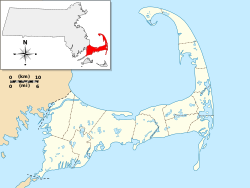Goodspeed House | |
 Goodspeed House | |
| Location | Barnstable, Massachusetts |
|---|---|
| Coordinates | 41°39′32″N70°25′10″W / 41.65889°N 70.41944°W |
| Built | c. 1653 (traditional) c. 1708 (assessed) |
| MPS | Barnstable MRA |
| NRHP reference No. | 87000235 [1] |
| Added to NRHP | March 13, 1987 |
The Goodspeed House is a historic house in Barnstable, Massachusetts. It is believed to have been built by Roger Goodspeed, Marstons Mills' first settler. [2] The house was listed on the National Register of Historic Places in 1987. [1]



